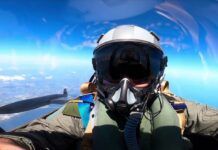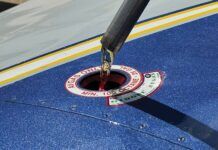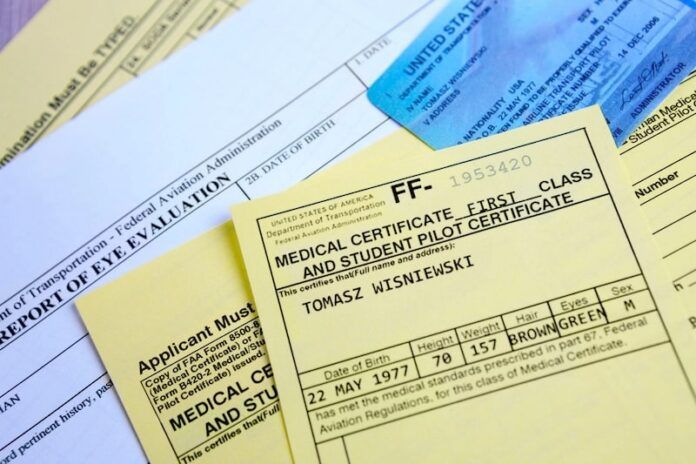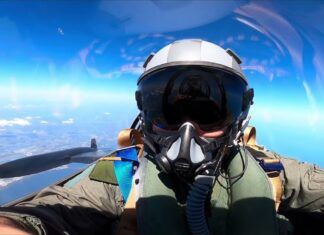About 10 years ago, the Federal Flight Surgeon’s Office decided that sleep apnea was the next scourge of the skies and must be eliminated. New research had determined that certain physical characteristics made it more likely that a person might suffer from the disorder, which can increase the chance of heart failure and sudden death. So it ordered AMEs across the country to send every pilot with a paunch for a sleep study at a cost of thousands of dollars. Filled with bureaucratic virtuousness, the decree was signed and put in force. There was no notice, no consultation, no announcement, just the sweep of a pen.
It’s funny how things come to light. A reader in Germany who ran a forum for floatplane pilots there sent me a note and asked if I had any more information on the new order, which he found while exploring the dark recesses of the FAA website. Well, within a few hours, suffice to say, the aviation world was alerted and the initiative was gone a few sleeps later.
Pilot medicals have always been a prickly subject and the agency has always seemed to cherry pick from medical advances in ways that make it increasingly difficult to qualify to fly airplanes. New diagnostic tools improve the ability to spot issues that threaten a pilot’s ability to fly, and the agency seems to pounce on those developments.
But treatments and cure rates have also vastly improved for scores of medical conditions and it seems to take forever for the FAA to acknowledge those advances and apply them to the medical fitness requirements. The approach is adversarial and puts pilots on the defensive and, when it’s least appropriate, secretive. There are numerous financial, personal and skill-testing obstacles to being a pilot, but it’s safe to say the one that scares pilots most is losing their medical.
So, how do they deal with the threat? It’s an open secret that plenty of pilots lie through their teeth to air medical examiners. And when lying won’t work, they hide potentially serious conditions from their family doctors to ensure the flight-ending diagnosis isn’t made. Blame whoever you want to but it’s a convoluted mess that presents a real threat to flight safety. It’s also a systemic problem and it needs a systemic solution.
A highly publicized incident earlier this year brought the issue of pilot mental health to the forefront. I doubt sleep apnea was ever going to do that, but I digress. When an Alaska Airlines pilot hitching a jump seat ride back to his base in San Francisco suddenly went berserk and pulled the fire extinguisher handles in the cramped confines of the E175 flight deck, there was all the usual blaming and demands for answers, but the perpetrator himself was able to change that narrative. Capt. Joseph Emerson came clean about his years of mental health issues and the loss of a close friend that culminated in his fateful decision above the Oregon coast.
A few days later, the FAA announced it was setting up a rulemaking committee to bring mental health assessment and its place in medical fitness up to date. “Mental health care has made great strides in recent years, and we want to make sure the FAA is considering those advances when we evaluate the health of pilots,” said newly confirmed FAA Administrator Mike Whitaker.
Not to be outdone, the NTSB then announced a daylong hearing on the topic to be held on Wednesday, although it inexplicably decided to make it an in-person hearing only with no livestream. Those of us who won’t be in Washington on Wednesday will have to wait for the rerun.
Nevertheless, the moves, though tentative, point to a new permissive approach by the FAA and those who try to guide its actions when it comes to pilot health. Don’t expect any instant changes. It will take years for anything concrete to come out of all this, if indeed anything does. But maybe the initiatives signal a move to help conserve the flight status of hundreds, if not thousands, of already-trained and motivated pilots who see a way to work collaboratively with FAA medical to solve their issues and fly safely.
More importantly, however, it might give pilots, who, after all, have always had the final say and ultimate responsibility to safely exercise the privilege, the fair shake that everyone wants and deserves.



































Russ, I’m not sure optimism is warranted just yet. It may not be wise for pilots to come forward today to an agency which yesterday would have used their disclosure against them. Given the collusion between government and the medical industry, a potential motive could be to create a new pool of “patients” which does not exist at this time.
“Given the collusion between government and the medical industry…”
Help me understand that.
I’ve been a physician for about 36 years and an AME for 26 years.
The government IS trying to control the health care industry and they do it though the computerized electronic medical record.
We physicians are micromanaged and the government’s wishes are implemented through a barrage of sticks and carrots that frankly make a person’s work life miserable nowadays.
Each keystroke we make is subject to government interrogation, and you can bet everything is recorded nd ready to be used against the doctor/AME/patient/airman.
The solution is simple: rationalize the medical requirements for all federal jobs where lives are at stake. For example, is there a single airline pilot on duty who is as superannuated, delusional, or simply bat-sh!t crazy as a significant percentage of our congress-critters? Who holds more lives in their hands?
Here, Here! (thumbs up!)
Its “Hear! Hear!” (not there! there!) 😁
👍👍👍👍👍
Superannuated deserves highlighting: superannuated • \soo-per-AN-yuh-way-tud\ • adjective. 1 : outmoded, old-fashioned 2 a : incapacitated or disqualified for active duty by advanced age b : older than the typical member of a specified group. (congress-critters?) 🤣
I learned a new favorite word today!
Also, agreed, all ‘congress-critters’ should be required to hold a first-class medical. This would solve a lot of our problems today, whether by removing the geriatric ward in congress, or by making it easier to maintain a first-class.
Russ–One of your better columns!
Perhaps the BASIC TENET in medicine is “pimum non nocere”–or “First, Do No Harm.”–or alternately, “aegresit mendendo”–“The cure is worse than the disease.”
This effects more than pilots, it is anyone required to meet medical certification standards. This means folks like Air Traffic Controllers and, yes, folks operating under basic med. Read the fine print of basic med that, in essence, requires you to self-certify you are medically fit to fly (thinly veiled requirement to follow all Class 3 requirements).
Personal story as a retired FAA Air Traffic Controller. My primary care physician became concerned about a rise in my blood pressure. Tried a few non-medical and even OTC methods to lower it without success. Finally, doc says I’ve got to start you on something so he prescribes a very common BP med at the lowest dose. Trying to be the honest, I’ll play ball guy, I dutifully report the new med to the Regional Flight Surgeon the next day.
Common sense would be to ask for a progress report or two and maybe restrict that I cannot work alone (have someone present in case I get sick, dizzy, etc) for a week or two.
Nope, immediate restriction of my medical clearance for 1 month … then follow-up exams for 3 more months. The immediate restriction meant I could not work any position at all – not even the Data or assistant positions. At the 1 month point, and after my doc completed a doctoral thesis regarding my condition, my medical clearance was placed on a month to month basis until the end of the 3 months.
Thankfully, my Tower Manager “found” administrative duties so I could continue to work and didn’t have to waste sick leave. Even he agreed it was absurd the FAA preferred I hide my condition (or go untreated) rather than seek treatment. Granted, such action for a serious or unusual situation would be appropriate, but for treating marginally elevated blood pressure without other symptoms or complications?
Oh, I’ll share in closing. This happened a bit over 20 years ago so today’s FAA may be less reactive (and rainbows are actually Unicorn farts, but I digress). The dosage of BP meds the FAA was concerned would cripple my little corner of the NAS hasn’t changed a single milligram since I started it. Wow, disaster averted LOL!
I’ve had a Special Issuance on my FAA Medical Cert. 1st Class for over a decade, plus a couple other issues. I don’t know about a “new” permissive approach by the FAA, but they have not been “hard over” towards me in the past. I remember a few decades ago when vision standards were much tighter, too, and they’ve been expanded. Yes, even the military, too.
I’ve had a medical waiver (special issuance)for “distant vision 20/400 corrected to 20/20 bilaterally” for 62 years and over 33,000 hours.
Wouldn’t you THINK that there there is no longer a purpose in these outdated standards? Couldn’t help but laugh–for years, pilots with a medical waiver for vision had to “have a spare set of glasses when exercising the privilege of their certificate.” I asked the medical examiner why this was included–the reply “In case the primary glasses get blown off in the slipstream!” (laugh).
I guess the FAA is still a bit behind the time–someone needs to tell them that we have ENCLOSED COCKPITS NOW!
As my high school civics teacher used to say, “Circumstances alter cases.”.
Government needs guide government behaviors. I know of a VietNam era draftee whose draft physical data was falsified by his vision test technician so the draftee could be qualified. The draftee’s myopia was outside the technician’s instrument’s measurement range so the technician simply put down 20/800, the maximum qualifying, and he was passed with imposed falsehood. I also knew others of that era’s Air Force volunteers who’d been passed on their physicals with obvious and significant miladies, one having had an automobile accident induced and frighteningly visible crushed left chest and internally collapsed left lung (he didn’t have the breath for PT so was separated during basic training) and another’s automobile accident caused fractured skull resulting his having a steel plate in his skull (they kept him).
Those were the years of the build-up to 500K in country so the joke was that the physical actually consisted of being told at the door to walk across the room and sit in the chair on the opposite wall: if you did so your physical condition was good enough to walk, your hearing was good enough to follow the instruction, and your vision was sufficient for you to find the chair.
Machiavelli said, “Everyone sees what you appear to be, few experience what you really are.”, “Politics have no relation to morals.”, and “Power is the pivot on which everything hinges. He who has the power is always right; the weaker is always wrong.”. Some things never change.
Just got my 3rd class renewed and had a surprise. While sitting waiting on the Dr’s assistant to type out (?still) the certificate she called to the Dr and said that she had a “situation!”. The Dr went into her office and they consulted in whispers. By now my ears had perked-up. The Dr asked me if I used “reading glasses” and I said “yes” (was wearing them looking at my phone). The assistant harrumphed and went back to typing. She presented me with the duplicate certs to sign and I noticed “Must wear corrective lenses at all times” in Limitations and I said that was not the case; I have 20/20 far and instrument-panel distances vision and only use readers for close-up or low-light reading, so usually during the day – no readers. She said it was a “new requirement” and must be adhered-to.
This – is the major problem. Low level bureaucrats, who are not pilots, are given power to make decisions about which they know little to nothing. Some assistant sees reading glasses and suddenly she has the medical and aviation prowess to determine whether you should fly.
The moment our elected officials decided to turn over full operation of the government to these people who don’t have to answer to anyone – they got a taste of power. And a lust for more. They view pilots as the privilege few and, critical theory being what it is, decided that the oppressed (them) should assume power and cut off those with any advantage. Welcome to our brave new world!
Exactly the reason why I have always used AME’s who are pilots and/or airplane owners. I have found they are more willing to go the extra mile to make sure any paperwork or bureaucratic issues are resolved so that the AME doesn’t have to defer to OKC unnecessarily.
Wise. My patients/clients would agree.
Unfortunately, I haven’t always found that to be the case. Pilot/airplane owner AMEs aren’t always the safety net they may seem to be (I sometimes wonder if some of them list pilot/airplane owner for the marketing even if they haven’t flown in years).
My experience is that AMEs who can do 1st class medicals are the ones to go to, because as one of them told me, they see airline pilots all the time with common conditions, so they know what paperwork is needed to keep them flying.
A good point! Look at the safety records for pilots operating under BasicMed.
Same for glider pilots–no medical required.
Same for balloon pilots–no medical required.
Same for pilots flying Light Sport.
Same for pilots flying under the old Ultralight provisions.
Same for skydiving.
I haven’t seen the oft-predicted spate of medical-induced accidents, DESPITE THE FACT THAT PEOPLE FLYING UNDER THESE RULES TEND TO DO SO BECAUSE THEY DON’T HAVE MEDICALS!
That, and Medical Waivers–puts the lie to the assumption that aviation medicals are effective and needed for non-commercial operations–if that WERE true, why don’t we have medicals for DRIVING private ground vehicles?
Don’t you think that’s on the DOT’s to-do list?
Not holding my breath on anything good coming out of those pilot mental health “committees”. The FAA past record of changing or creating a medical standard has not been pilot friendly ones. The sleep apnea one the author points out and a cholesterol standard where one did not (and still does not) exist back in the 1990’s are perfect examples. Silly stuff like this makes me glad I am not to far from retirement!
I fully expect the FAA’s conclusion from this will be that it needs to find ways to discover pilots who might have mental health issues, emphasis on the “might”. It’s how they handle pretty much every other potential health issue (see “sleep apnea” for example).
I just sifted through my emails from a decade ago. Yep. Still there. December 2, 2013. Russ, we have aged well.
JaBa, I knew it was you.
Wow. I knew it was about 10 years ago but I didn’t know it was exactly 10 years ago. Funny. We were just kids back then:)
I am 86 years old and I can no longer fly because THEY said so.
As I said elsewhere, I hope the FAA does a better job at this issue than they have in finding a suitable unleaded Avgas. Considering their track record, I’m not very optimistic.
Is there any room/need for an ASRS-like mechanism that allows pilots/controllers to come clean with certain issues and fly/work on condition of no symptoms? Not sure how that would work but the premise is to eliminate the cat/mouse relationship between pilot/AME/FAA